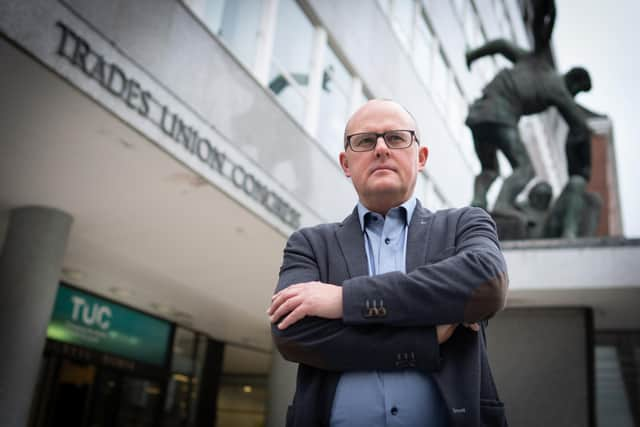Government threatens tax rises if it caves in to biggest day of strikes in a decade
Today teachers, university staff, train drivers, civil servants, bus drivers and security guards will all go on strike as workers demand wages keep up with record levels of inflation during the cost of living crisis.
However, yesterday Richard Holden, a transport minister, said the Government cannot afford the pay demands of unions.
Advertisement
Hide AdAdvertisement
Hide AdHe told Times Radio: “Inflation-busting pay rises, the country just can’t afford because we’d either have to slash public services or give massive tax rises to working families up and down the country. And that would really hit the poorest hardest.”


It comes as the Government’s legislation for minimum service levels, referred to as anti-strike legislation by trade unions, passed through the House of Commons late on Monday in its route to becoming law.
Downing Street has conceded that Wednesday’s mass strike action will be “very difficult”.
The Prime Minister’s official spokesman said: “We know that there will be significant disruption given the scale of the strike action that is taking place tomorrow and that will be very difficult for the public trying to go about their daily lives.
Advertisement
Hide AdAdvertisement
Hide Ad“We are upfront that this will disrupt people’s lives and that’s why we think negotiations rather than picket lines are the right approach.”
Last night new research from the TUC suggested that the average public sector worker is over £200 a month worse off compared to a decade ago.
The TUC said up to 500,000 workers will be on strike, making it the biggest day of industrial action since 2011, when more than two million workers and over 30 trade unions took part in strike action on the same day over public sector pensions.
Its general secretary Paul Nowak said: “The right to strike is a fundamental British liberty, but the Government is threatening to sack workers for exercising that basic right.”
Advertisement
Hide AdAdvertisement
Hide AdIndustrial action by members of the National Education Union will go ahead on Wednesday 1 February as last-ditch talks between the Government and unions ended without adequate progress.
The strike action will impact more than 23,000 schools in England and Wales with three more strike days affecting North Yorkshire set for 28 February, 15 March and 16 March.
Kevin Courtney, joint general secretary of the National Education Union (NEU), said ministers should be concerned about the 40,000 new sign-ups to the union since the teacher strikes were announced a fortnight ago.
North Yorkshire County Council has said that it will support schools with “general guidance of mitigating the impact on pupils” but added that individual schools will coordinate the impact of strike action.
Advertisement
Hide AdAdvertisement
Hide AdDowning Street has said it is “disappointing” that school leaders do not know fully how many teachers will be available for work until the strike day itself.
The Prime Minister’s official spokesman said: “It is disappointing that school leaders don’t have the clarity they need to plan appropriately.”
Meanwhile Steve Barclay, the Health Secretary, said the Government is “engaging” with trade unions to try to end strikes in the NHS.
He told the Health and Social Care Committee yesterday: “The chair of the NHS staff council … said our discussion had been constructive and that is very much the tenure with which we are engaging with trade union colleagues.”
Advertisement
Hide AdAdvertisement
Hide AdThousands of ambulance workers across five services in England will strike on 10 February in the long-running dispute over pay and staffing, Unison announced yesterday.
Strikes will now be happening across the NHS every day next week apart from Wednesday.
In the same week members of Unison and Prospect working in areas including river inspection, flood forecasting, coastal risk management and pollution control will walk out for 12 hours on 8 February.